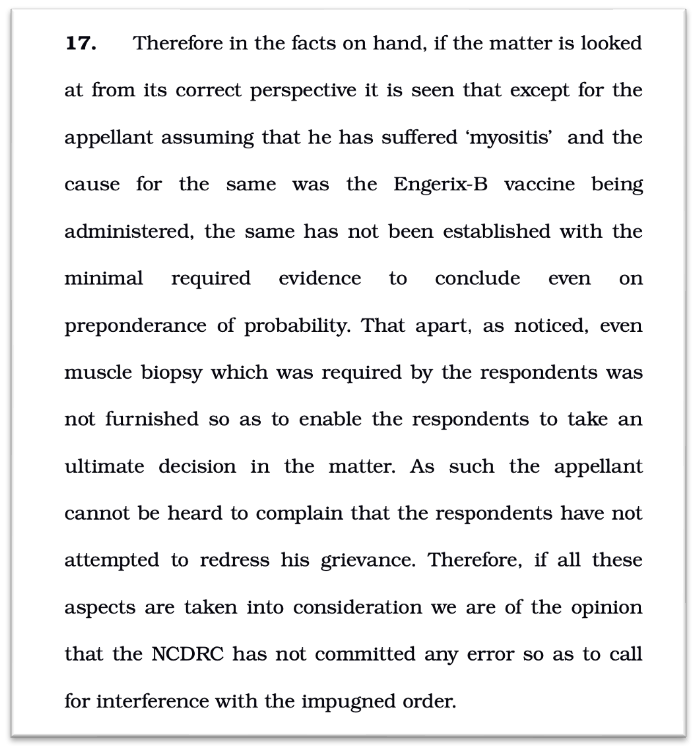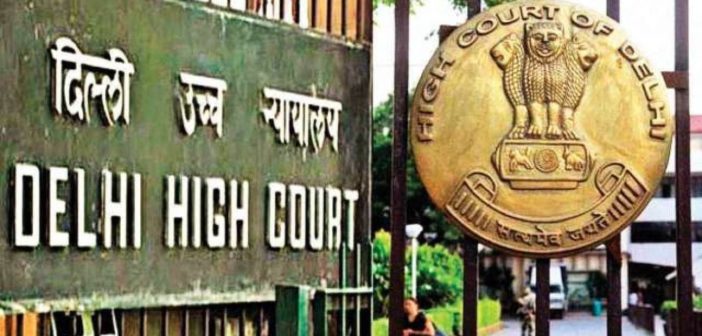In this week’s review of Court Judgments, we look at Supreme Court’s judgment regarding the liability of a pharma company with respect to impact of a vaccine, Delhi High court’s observation with respect to the continued qualification of father as a natural guardian despite second marriage after wife’s death, Karnataka High Court’s consideration to waive off the cooling period related to case of mutual divorce, Madras High Court’s observation relating to criteria for compassionate employment to the married daughter of deceased and Punjab & Haryana’s high court’s statement regarding BSF’s unjustified termination of employee who couldn’t complete basic training due to curable disease contracted after joining.
Delhi HC: Father’s second marriage after first wife’s death doesn’t disqualify him from being child’s natural guardian
A division bench of Delhi High Court comprising of Justice Suresh Kumar Kait and Justice Neena Bansal Krishna observed that mere second marriage of the father, who lost his first wife, cannot be considered as a disqualification from him continuing as a natural guardian of his child.
In the case, Mohd. Irshad & Anr vs. Nadeem, an appeal was moved by the maternal grandparents of a minor boy challenging a family court order that has dismissed their petition to appoint them as the guardian of the minor child and also seeking permanent custody.
As per the details of the case, the couple got married in 2007 and the child was born in 2008. The grandparents held that their daughter was killed by the husband in 2010 due to dowry demands and harassment. However, the husband and his family members were acquitted of the criminal charges by the child’s grandparents in 2012. They also claim that the child was handed over to them after the father was absconding.
The case presented by the grandparents was that the child’s custody has always been with them, and it is only after the acquittal of the husband that he sought the transfer of the custody.
They further presented that the father remarried and had a child from the second marriage, which further renders him not having the capacity to take custody of the child. However, the bench dismissed the plea of grandparents to be appointed as the guardian of the child. It noted that apart from a criminal trial, there was no other factor that disqualifies the husband to be the guardian.
It supported the judgment of the family court that denied the grandparents to be appointed as the minor’s guardians. It noted that there can be no substitute for the affection of a natural parent. The immense love and affection of the grandparents towards the child cannot act as a substitute. The bench considered it appropriate to initially grant limited visitation rights to the father which may be re-visited after one year on his application, if the circumstances so justify.
It also observed that even the disparity in financial status cannot be a relevant factor for denying the custody of a child to the natural parent.
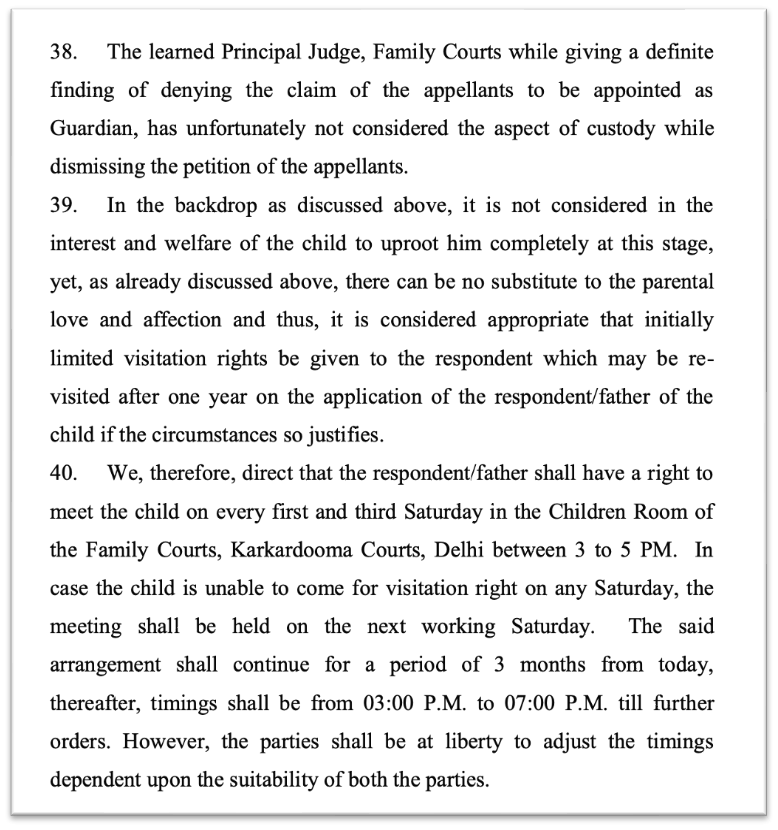
Karnataka HC: Waives 1-year cooling off period for mutual divorce under Special Marriage Act.
In a petition filed by an estranged couple, the division bench of Karnataka High Court comprising of Justice G. Narendar and Justice Vijaykumar Patil waived off the statutory cooling period of one year before deciding on the petition for divorce by mutual consent, under Special Marriage Act.
It set aside the order of the family court which had earlier dismissed their application under Section 28(2) of the said Act. The couple filed an appeal in the High Court questioning the family court order. In their petition, they argued the parties and their respective family members have tried to resolve the dispute amicably and to unite them. However, the relationship has become irreconcilable, and they have decided to live separately.
They also submitted that after detailed discussion with their parents and well-wishers, they have come to the conclusion that there is no compatibility between them, and they have decided to concentrate on their careers.
The bench referred to the Supreme Court judgment in the case of Amardeep Singh vs. Harveen Kaur. It observed that the very object of providing a cooling period for filing of the petition and a further period of six months from the date of filing the petition is with an object to see that the parties to the proceeding can change their mind and resolve their differences. If after a period of six months, the parties decide to go ahead with divorce, they can make a motion before the jurisdictional Court so that it can consider the case on its merits.
It stated that the Supreme Court has clearly held that the period mentioned in the statute is not mandatory, but it is a directory in nature, however, the Courts while exercising discretion are required to look into the facts and circumstances of each case.

The bench noted that both the appellants are engineering graduates and working in private companies in Bengaluru. Their pleadings made it clear that they have realised that they have personality differences and strong likes and dislikes, despite making best efforts to reconcile. Hence, the court found it appropriate to waive the statutory period by directing the Family Court to consider the case of the appellants for dissolution of marriage by mutual consent on its merits and in accordance with the law.
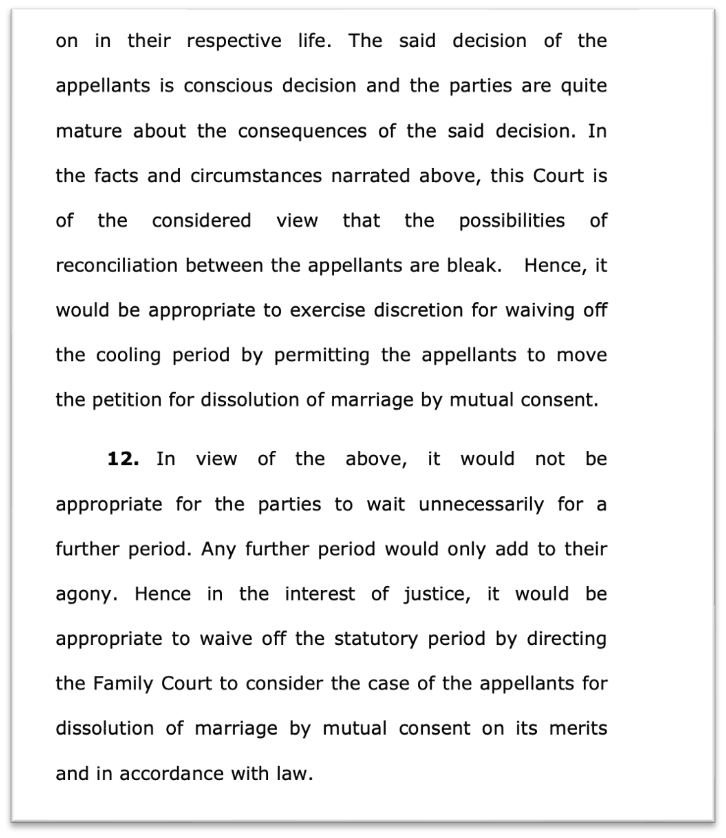
Madras HC: Married daughter cannot challenge denial of compassionate appointment in absence of dependency, financial hardship of bereaved family.
In the case, A Chinnaponnu vs. Union of India & ors, the Madras High Court has made it clear that even though married daughters are equally eligible to be considered for compassionate employment, their appointment need to consider criteria such as – dependency, financial status of bereaved family etc.
The High Court bench consisting of Justice D Krishnakumar and Justice PB Balaji, was hearing a plea challenging the Central Administrative Tribunal’s order refusing to interfere with the denial of compassionate appointment to the married daughter of a Gangmate in the Southern railway who died in harness. The petitioners were the wife and daughter of the deceased employee.
The daughter submitted that since her brother and sister gave consent to apply for a compassionate appointment, she has made a request to the Southern Railway seeking a compassionate appointment. However, it was rejected by the department. The daughter also submitted before the court that she was taking care of the entire family and presented an argument that the request of appointment was rejected merely on the ground that she was married.
The Railways opposed the plea and submitted that her request for a compassionate appointment was rejected not because she was married but for the reason, she did not fulfil the criteria laid down by the Railway Board for offering a compassionate appointment.
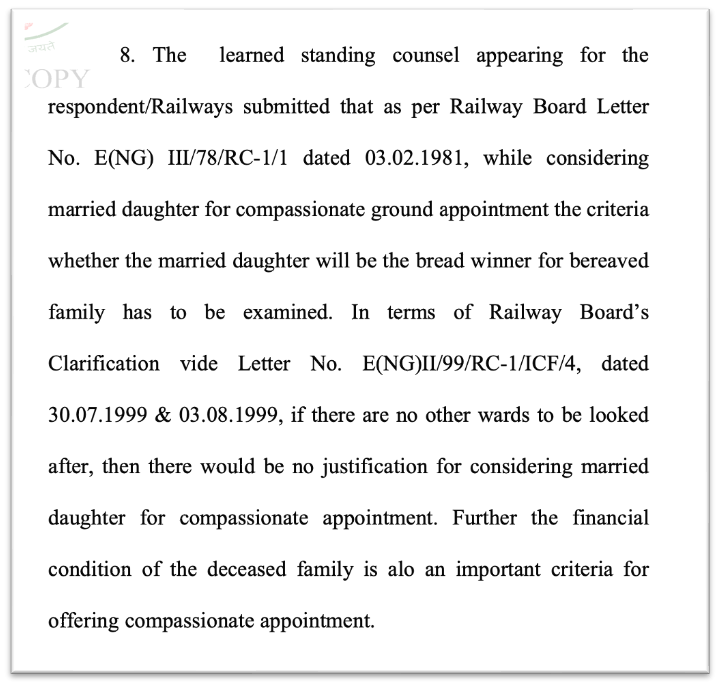
The court noted that the appellant i.e., daughter got married in 2006, four years before her father’s death. It noted that her brothers and sisters were also married and her mother i.e., wife of the deceased is receiving a family pension of Rs. 18,734 and does not have other minor children to take care of.
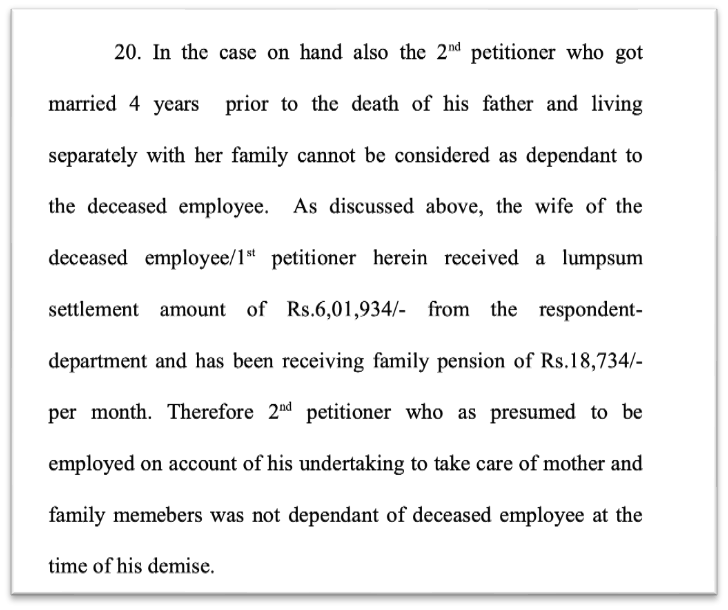
It observed that the application was rejected not because of the daughter’s marital status but the financial situation of the family. It emphasized that the Supreme Court in various decisions has held that the mere death of an employee in harness does not entitle the family to compassionate employment, the financial condition of the family has to be examined by the authorities.
Punjab & Haryana HC: BSF unjustified to terminate employee who couldn’t complete basic training due to curable disease contracted after joining.
In the case of a BSF constable who was terminated from service for not being able to complete basic training because he was declared ‘unfit, the single judge bench of Punjab & Haryana High Court consisting of Justice Jagmohan Bansal stated that it is highly unjustified to weed out an employee on the ground that he cannot complete basic training because of a curable disease which he has suffered post joining of services.
The court was hearing the plea of Amaranth Ram seeking the setting aside of an order passed in 2014 whereby his name had been struck off from the strength of BSF. He was provisionally selected as a Constable (GD) in BSF. He reported to the Subsidiary Training Centre, Hoshiarpur, and thereafter suffered from fever. He was referred to the civil hospital where he was diagnosed with bone tuberculosis. From October 2011 to May 2012, he remained under treatment at PGI, Chandigarh and in the medical report it was confirmed that he is fit to re-join services. However, BSF did not accept the report of the PGI, Chandigarh, and asked him to face the medical board.
He was again examined by a medical board which opined that he is suffering from Bone TB, and he is unfit to undergo Basic Recruitment Training and unsuitable for further retention in service. On his request, he was re-examined, and the review board also declared him unfit for basic training.
The petitioner put forth the argument that at the time of recruitment, he was not suffering from any ailment, and he was found medically fit and after joining has suffered from an alleged disease, which is incurable.
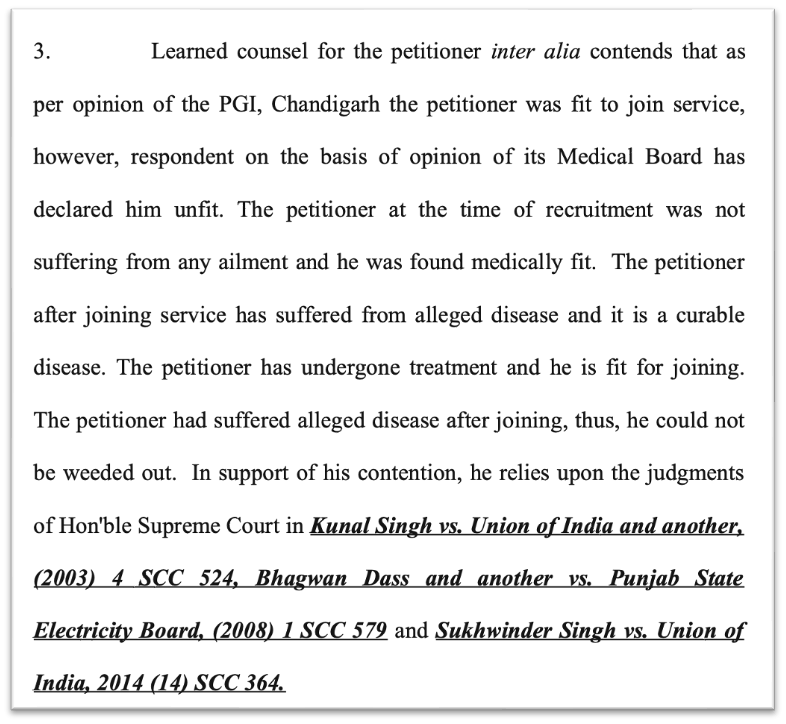
The judge stated that a person after joining service may become incompetent to complete basic training while on duty and on account of reasons beyond his control like accidents during the movement of force from one place to another place, attacks by militants, etc. In such circumstances, a person who has fulfilled all the required parameters at the time of recruitment cannot be removed because of unavoidable circumstances which impacted the training.
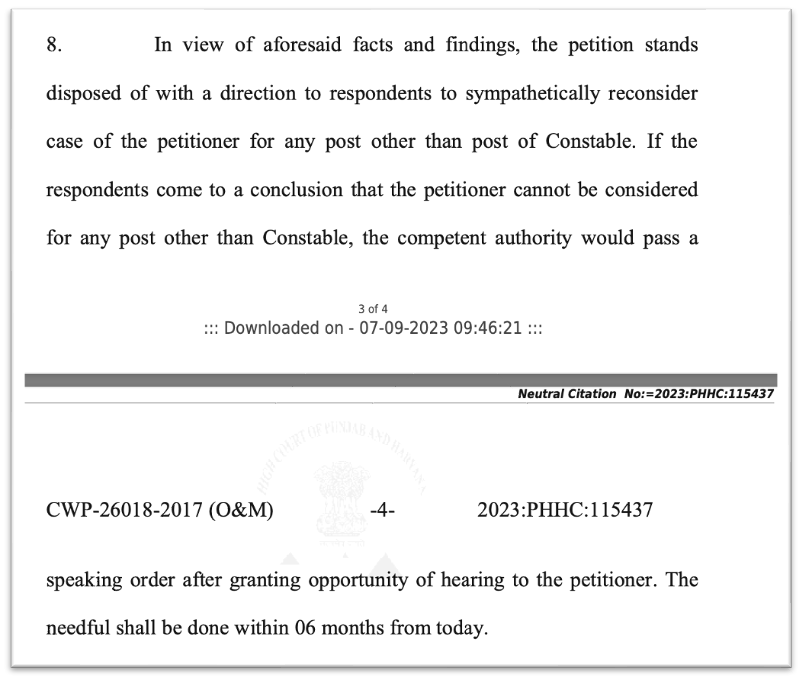
Supreme Court: Refuses to hold Pharma company liable for not mentioning adverse reaction of vaccination
In the case, Prakash Bang vs. Glaxo Smithkline Pharmaceuticals Ltd. & Anr, the Supreme Court has upheld an order of the National Consumer Disputes Redressal Commission (NCDRC) where the Commission had held that there was no deficiency in the service of the drug-manufacturer, Glaxo Smithkline Pharmaceuticals Ltd, in relation to administration of vaccine Engerix-B.
In the case, the complainant held that he along with his family members had got the vaccine administered by their family doctor and developed ‘myositis’ as an adverse reaction due to the administration of the vaccine.
Looking into the case, the Court noted that the complainant had failed to establish that he had suffered an adverse reaction due to the vaccination. It also held that non-mentioning of ‘myositis’ as an adverse reaction in the literature accompanying the injection or on the ‘vial’, did not amount to ‘deficiency of service’ on the part of the pharmaceutical company, particularly when the adverse reaction was to the minimal level.
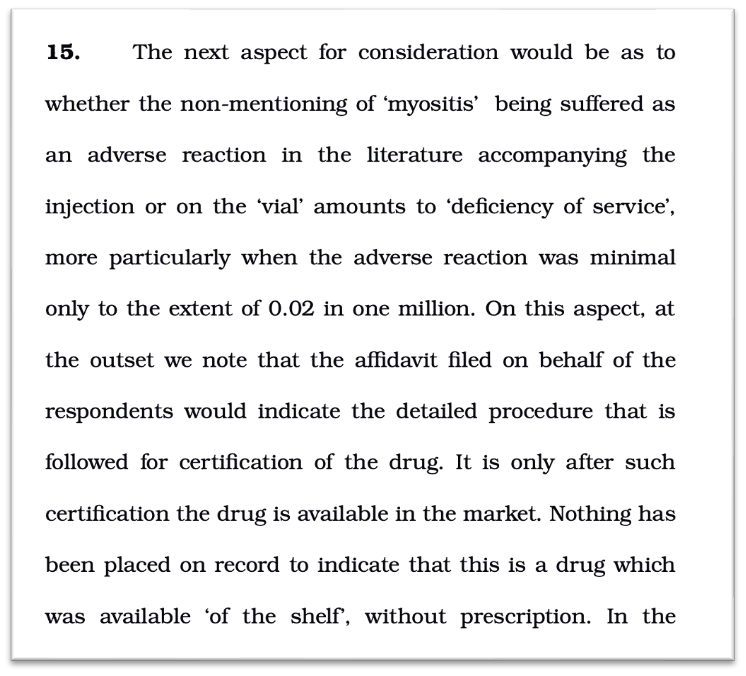
The court took into account the affidavit of the manufacturer which indicated that detailed procedure was followed in the certification of the drug. It highlighted that the drug was not available for administration without the doctor’s prescription and that the family doctor also owed a duty, especially because he has prescribed the said drug and it is his responsibility to know more details about the vaccination.
The court further noted that the same drug was administered to all the family members and after the third dose was administered to the appellant, he had suffered the present discomfort. This also raises the question as to whether it had been administered in the manner and at this spot where it ought to be administered.
Earlier, NCRDC dismissed the consumer complaint seeking compensation of over Rs. 90 Lakhs from drug manufacturer, Glaxo Smithkline Pharmaceuticals. It concluded that the complainant had failed to establish his case, both with respect to (i) the alleged defect in the drug or (ii) any negligence amounting to deficiency in service on the part of the pharmaceutical company.
